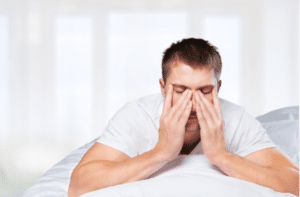The Symptoms of Sleep Apnea

What is sleep apnea?
Obstructive sleep apnea is the most common form of sleep apnea. It happens when the muscles in the back of the throat relax as you sleep, causing your airway to narrow. This prevents an adequate amount of air from getting into your system and your oxygen level drops. Your brain wakes you up because you aren’t getting enough oxygen. This can happen several times a night – even several times an hour, but you may not even realize you are waking up so often in the middle of the night.
How do you know that it’s sleep apnea?
You may wonder if your sleep problems are temporary and harmless or if they are something serious. You may need your partner to help you identify some of the symptoms of sleep apnea. They include:
• Gasping for air while sleeping
• Loud snoring
• Periods where you stop breathing
• Feeling excessively tired during the day
• Irritability
• Morning headache
• Morning dry mouth
What can be done about sleep apnea?
While continuous positive airway pressure (CPAP) machines are commonly used to treat people with sleep apnea, many people find them bulky, uncomfortable, and just a hassle to deal with. Another option is an oral appliance – a piece of plastic that fits over your teeth at night that repositions your tongue and jaw and opens the airway to help you breathe properly.
eos dental sleep can help you figure out why you are having trouble sleeping and can fit you for an oral appliance if that’s what you need. Call the office in Philadelphia for an appointment today, at (215) 241-0700.
